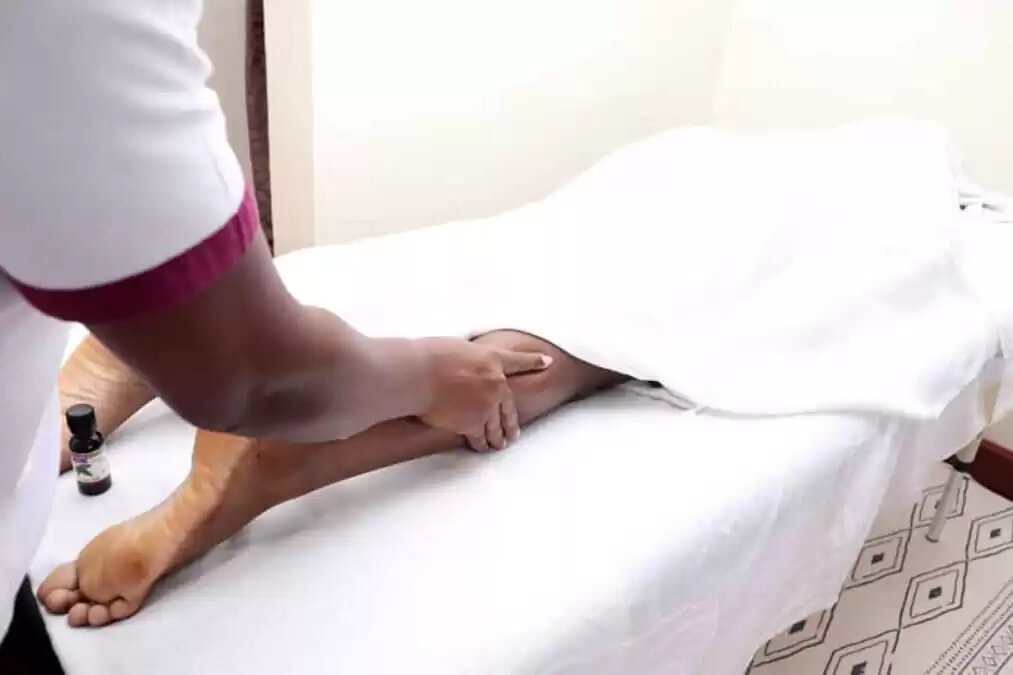
In this post, you will learn what aromatherapy massage is and its purpose, what essential oils are, and the benefits and risks associated with the use of essential oils in a massage treatment.
On this page
Intro
More consumers are testing out essential oil products than ever before. They diffuse them at home or dilute them for skin usage. Though trending in Kenya, essential oils have been used by cultures all over the globe for medicinal and aromatic purposes over the last several thousand years, including in ancient Egypt, Greece, India, and China.
What is aromatherapy massage?
An aromatherapy massage basically incorporates the use of essential oils into the typical (deep tissue, Swedish, prenatal or hot stone) massage.

The massage therapist will diffuse essential oil in the room during your massage session or/and add a few drops of oil to massage lotion/carrier oil and apply it to your skin.
The massage technique itself involves alternating between applying gentle and harder pressure to press and rub the muscles and lymph nodes.
What are essential oils?

Essential oils are extracts from plants captured to preserve their natural scent, flavor, and all their beneficial properties. Each essential oil has unique characteristics that determine its use.
Popular essential oils and their characteristics
My favorite five essential oils are rosemary, lemon, eucalyptus, jasmine, and lavender. Here is a non-exhaustive list of characteristics of some of the popular essential oils;
- Peppermint; boosts energy and aids digestion
- Lavender; relieves stress
- Sandalwood; calms nerves and helps with focus
- Bergamot; reduces stress and improves skin conditions like eczema
- Rosemary; improves mood and reduces anxiety
- Chamomile; improves mood and relaxation
- Ylang-Ylang; treats headaches, nausea, and skin conditions
- Tea Tree; fights infections and boosts immunity
- Jasmine; helps with depression, childbirth, and libido
- Lemon; aids digestion, boosts the mood and reduces headaches
- Eucalyptus; treats nasal/chest congestion and eases arthritis pain
Other essential oils for aromatherapy are; cedarwood, geranium, and ginger.
What is the purpose of aromatherapy massage?
Essential oils enhance the purpose of massage therapy; to improve your physical and mental well-being. An aromatherapy massage is used for different reasons including relaxation, pain management, and improved mood.
Not only does your body benefit the direct contact with the essential oils, but the oils are also alleged to have certain healing properties upon inhalation.
For example, if you have aches and pains from depression, I add a mood-boosting oil like lemon to make you feel better. For fatigue, I blend lavender and rosemary.
Other blends that I frequently use are lavender and eucalyptus, jasmine and lemon, or peppermint and lemon.
Are there risks in aromatherapy massage?
You need to be aware of the lack of regulation of essential oils used in an aromatherapy massage. Since many essential oils are considered cosmetics, the Food and Drug Administration doesn’t regulate them for safety and effectiveness. Essential oils should be used sparingly to avoid toxicity and allergic reactions.
Essential oils are generally considered safe to inhale or apply to the skin if they’ve been combined with a base oil. They should not be eaten.
The use of essential oils is perfectly safe for pregnant women, but it is recommended to avoid jasmine since it can induce labor by stimulating uterine contractions. However, during labor, jasmine will be helpful in relieving pain.
There are generally few risks associated with an aromatherapy massage. One consideration is possible sensitivity to the essential oils used during your session.

Your massage therapist should always dilute the oil with massage lotion or carrier oil before applying it to the skin.
The use of undiluted essential oil can cause skin irritation and allergic reaction.
Possible symptoms of an allergic reaction to essential oils include; rash, hives, redness, swelling, and itchiness.
If you’re unsure about a particular oil, ask the therapist to diffuse it in the room instead of applying it directly to your skin.
Summary
Essential oils and aromatherapy massage are holistic methods of healing that do not involve any sort of drugs.
Would you like to schedule an aromatherapy message with us? Go to our booking page and pick your best slot.

Do you regularly diffuse essential oils in your home or have regular aromatherapy massage? How has your experience been? Your questions on aromatherapy massage are welcome also.
Use the button below to reach me.
Last Updated on February 19, 2021

